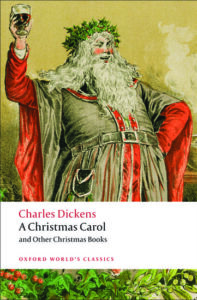 Whilst reading Charles Dickens’ The Battle of Life last night, I happened upon a reference to Miles and Friar Bacon, two characters not in the novel itself and whom I was unable to place in any other work of history or literature. Upon researching further I discovered that they are characters in the play Friar Bacon and Friar Bungay, an Elizabethan period comedy by Robert Greene.
Whilst reading Charles Dickens’ The Battle of Life last night, I happened upon a reference to Miles and Friar Bacon, two characters not in the novel itself and whom I was unable to place in any other work of history or literature. Upon researching further I discovered that they are characters in the play Friar Bacon and Friar Bungay, an Elizabethan period comedy by Robert Greene.
Now remember; this Dickens novel is one of his collected Christmas Stories, written and published for a general audience, which implies that he expected them to understand the reference (one doesn’t insert material into popular literature that is too obscure to have been widely understood). As Greene’s plays are all but lost to most today, save the most astute of English literature scholars (and even then “you’d have a job”) I was once again reminded just how much knowledge an average reader from centuries past could be assumed to know about a wide range of subjects.
For example, in his A Christmas Carol, Dickens draws upon the phenomenon of bioluminescent bacteria growing on shellfish as the decompose to describe the vision of Marley’s face that appears in the knocker on the door of the building in which Scrooge resides:
And then let any man explain to me, if he can, how it happened that Scrooge, having his key in the lock of the door, saw in the knocker, without its undergoing any intermediate process of change—not a knocker, but Marley’s face.
It was not in impenetrable shadow as the other objects in the yard were, but had a dismal light about it, like a bad lobster in a dark cellar.
– A Christmas Carol, Stave 1
Upon reading this, I had a suspicion that it might be related to a decomposition process, however I had to spend a bit of time doing research in order to verify this. This is not to say that most of Dickens’ readers would have known why a deteriorating lobster would have been glowing, however it was clearly assumed by Dickens that they would have known THAT they it did so – something which this son of a commercial fisherman who grew up on a coastal town where fishing was the primary industry and who has spent the past three decades or so intensively reading and writing about books about natural history did not.
And again, at the beginning of The Cricket on the Hearth, we read that
Mrs. Peerybingle, going out into the raw twilight, and clicking over the wet stones in a pair of pattens that worked innumerable rough impressions of the first proposition in Euclid all about the yard – Mrs. Peerybingle filled the kettle at the water-butt.
– The Cricket on the Hearth, Chirp the First
For this metaphor to work, readers contemporary to Dickens would have to have been assumed to know the first proposition of Euclid (Proposition I.1: To construct an equilateral triangle on a given finite straight line.). This particular metaphor is even more challenging to a reader today as many have now not only never studied Euclid (or alas, could even identify who Euclid was) and so would likely now be aware that this proposition refers to the creation of equilateral triangles, but few other than clothing historians and dedicated readers of Jane Austen novels would now know what “pattens” were.
I often find myself impressed by and musing upon such matters as these, which may admittedly seem to be not worth notice to many, due to my increasing awareness of and irritation by a prevailing attitude today that the advancements in technology we have experienced over the past few decades are indicative of a general increase in knowledge over the past. While this is true for select groups in select subject areas, I am more often finding that as a society we have forgotten, and are continuing to forget more than we are learning. And what’s worse, as a whole, we don’t seem to be all that concerned about it, too often trusting in the little electronic distraction devices in our pockets to replace our own memories.
Perhaps one day soon a Dickensian ghost of things to come will visit us all with a vision warning us of our future if we fail to amend our ways. For my part, I prefer to take action now by learning all I can and actively seeking to improve my memory, thus perhaps giving this spectral visitor a reason to check my name off its to-do list for the particular evening on which I’m scheduled. I’m sure it will be busy enough and I suspect it would appreciate the opportunity for a tea break.
